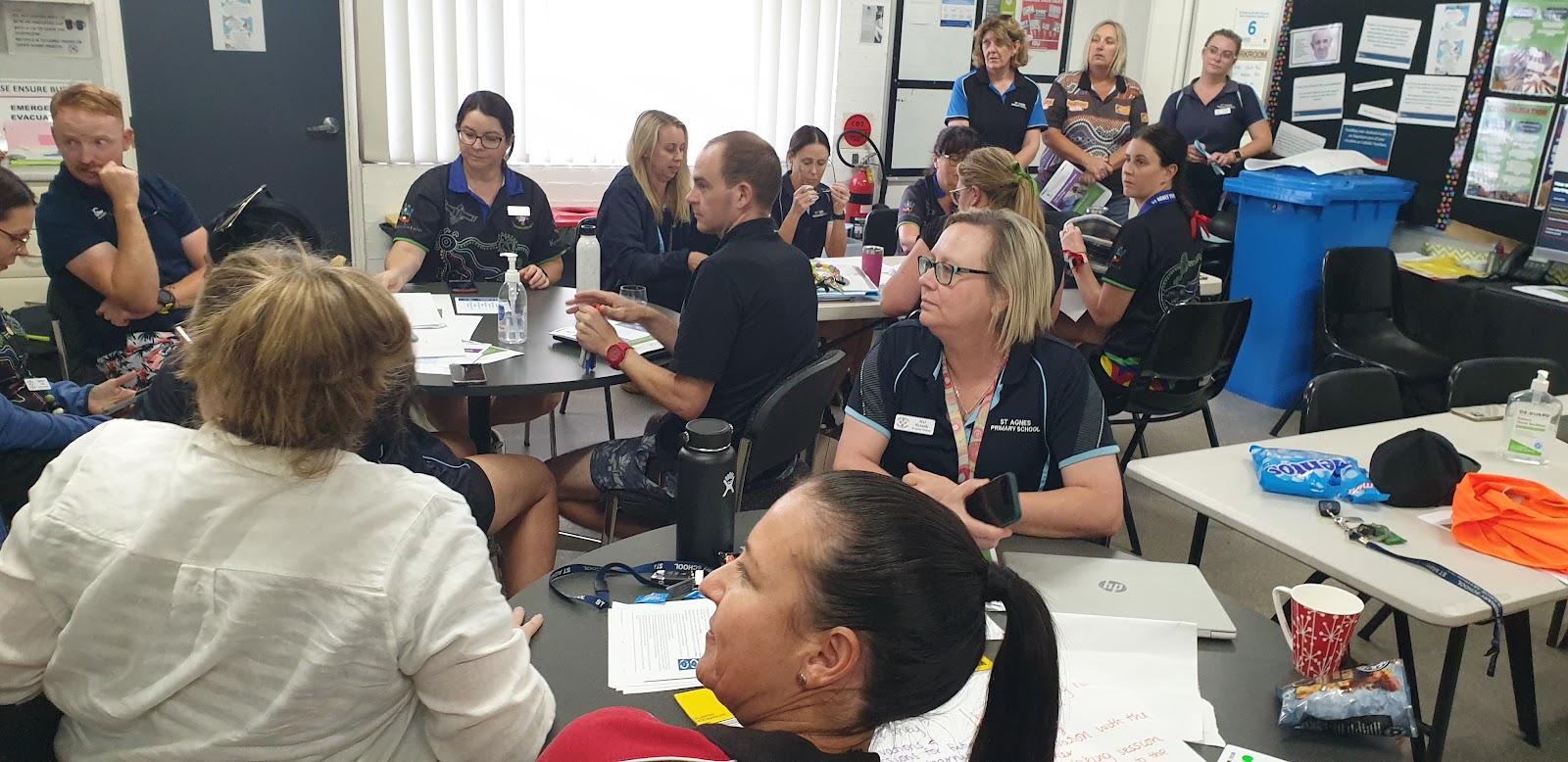Staff Development Day Term 2 2022
We began our day reviewing Chapter 7 from 'Clarity.' Staff discussed and shared their key learnings around Data Walls.
Staff noticed how data walls visually present achievement and growth. They shared statements around how data walls are a preventive measure in response to student needs that should be co-constructed and therefore co-owned by staff. It became clear the priority and role of Case Management Meetings (CMM's) in response to the data of a student. they saw these meetings as an opportunity to brainstorm, plan, implement, reflect and evaluate instructional strategies that are and are going to be put in place. The data wall was something they felt provided evidence of intervention and prevention. Whereas, CMM's are a community of professional trust, where there is no judgement on the teacher's practice but instead a focus on instruction strategies that have been put in place so far, the strengths of the students and where the teacher should go next in moving them forward in their writing journey.
Staff were tasked with making their own data walls using the given data set.
Staff also designed their student card that would go on the wall. They were shown exemplars after creating their own. They wanted to ensure their student cards showed growth as well as achievement.
How important is the key - what would be included?
Should we colour for cohorts?
Most walls displayed benchmark but not growth.
Should we include if students have received intervention?
How can we show or track yearly/semester growth?
What would the QR code link to?
What is important at first glance?
Should the wall show achievement and card could show growth?
What is the purpose of the data wall?
Where should the students be at, at a point in time.
How do we make sure we don’t miss any students?
The power of the wall is in conversation/reflection and instruction that follows.
How can we create a clear snapshot?
Who is struggling, who is stuck and who needs extension? Will this be obvious?
Is historical growth needed?
Most table groups felt that we may want data from the previous years to track growth. This would help us to know where the students came from, where they are at and give us a potential where to.
One staff member commented 'If we move to writing, and using the progressions, it would be too much information. We could, as a whole school, focus on one area from the learning progressions and track that for a year. Would we focus on one area for more than one year?'
Another staff member added: 'We could use a pre and post assessment and track growth throughout the year to help with this perhaps?'
Staff were asked to read the Case Management brochure put out by the CSO.
What data will we use?
The CMM lends itself to engaging with High yield strategies to learn from each other.
The data wall is a visual display to ensure students are at the forefront and helps with the shift in mindset of 'my' students to 'our' students.
When do we discuss and reflect on the data?
No judgement - must be positive and supportive.
CMMs use the collective wisdom of teachers.
Data walls need to be evaluated periodically to ensure they are fit for purpose.
As more and more questions came to light we asked teams to jot them down.
To conclude our day we asked teams to consider: 'What data should we use? What data is available?'
The Progressions were then considered. They allowed for whole school data collection and relevance. But staff felt they were overwhelming as a whole and wanted to narrow the focus. Although staff ere already using them, they felt overwhelmed by the Learning Progressions and not as familiar with them then the NAPLAN criteria. Most saw this however, as a possible learning opportunity. Staff agreed they liked how the Progressions enabled them to be more specific in measuring and targeting impact. They also commented on how they provide 'a where to next.' The possibility of the Learning Progressions on the data wall also meant that staff were able to take the enormity of them to a smaller focus that is more user friendly.
Staff also discussed the possibility of having work samples including different KLA's to create the data wall. These are regular and in the moment. However, upon further reflection staff began to consider how these might be inconsistent across the school.
So the vote was?
NAPLAN, Progressions or Work Samples for the wall.
But then came a spanner. In the brochures St Peter's Primary (a Parish school) described their use of essential learning from the syllabus as the basis of their data wall. Luckily, we were able to share recent communication from their LOP and how they are now exploring changing their wall to something else. Although they had done a lot of work in that particular space, the wall wasn't being used.
Our staff then voted for progressions to be used on the proviso the NAPLAN criteria we currently use is used to help narrow the focus. Staff were also keen for a portable wall that we could bring to multiple meetings and have student cards that didn't include a QR code.
.png)
.png)
.jpg)
.jpg)
.jpg)
.jpg)
.jpg)
.png)
.png)
.png)
.png)
.png)
.png)
.png)



















.png)
.png)
.png)
.png)














Comments
Post a Comment